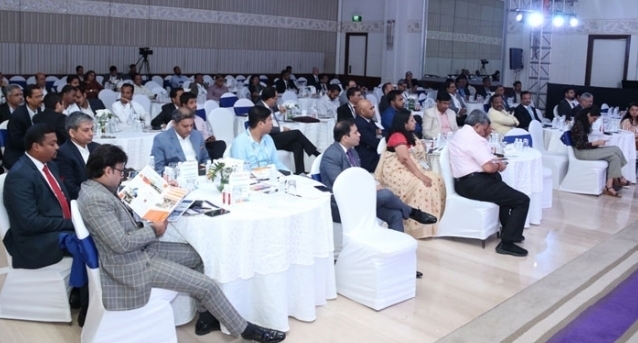Ecommerce Logistics Summit in India deliberates on ever-changing ecommerce industry
The inaugural edition of Ecommerce Logistics Summit 2019, organised by Indian Transport

August 24, 2019: The inaugural edition of Ecommerce Logistics Summit 2019, organised by Indian Transport & Logistics News (ITLN), one of the publications from the STAT Media Group, offered valuable insights into the growing and changing ecommerce logistics segment. The summit was held on August 22, 2019, at ITC Gardenia in Bengaluru, India.
The summit was sponsored by Bangalore International Airport Limited (BIAL), Air India SATS, Air Menzies Bangalore, DHL India, and GreyOrange.
Supplier the silent partner in logistics: Vandana Aggarwal at Ecommerce Logistics Summit@BLRAirport @DHL_India @MenziesAMS @GoGreyOrange @goairlinesindia @skywaysgroup @MoglixBusiness @EunimartLtd @flyspicejet @delhivery #AISATS #ecommLogSummit https://t.co/7t0O3ORzrs
— ITLN Live (@ITLNLive) August 24, 2019
Inaugurating the Summit, Vandana Aggarwal, economic advisor, ministry of civil aviation, the government of India urged airline and logistics industry stakeholders to adopt districts to develop community trade. "We have caught up with the rest of the world when it comes to ecommerce," she said while giving a historical perspective on regulation governing trade. She also narrated an anecdote to say that the supplier is a silent or shunya (zero) partner in the supply chain and invited stakeholders to read drone regulations and offer feedback and dialogue.
Addressing the attendees, Satyaki Raghunath, chief strategy & development official, BIAL said, "We need to do a lot more in India. We need to take advantage of the fact that we are a 1.5 billion population. We are targeting a $5 trillion economy over the next 4-5 years. Cargo and logistics are going to be centre stage of many things," said Satyaki, outlining BIAL's concerted efforts taken to drive cargo initiatives in terms of physical infrastructure. He also stressed on customer service as the most essential. "If you're not looking at your customer, you're really making a mistake," he said.
The first panel on 'Building business intelligence in the ecommerce supply chain' discussed how critical business intelligence is to ecommerce shippers and logistics service providers. Speaking on data integration, Sujit Subramanian, vice president, cargo, GoAir said, "If we receive organised data from all stakeholders about our flights... for example, it would be easier to plan the turnaround for GoAir."
Panel 2 with the topic - 'Keeping the customer at the center of your omnichannel world' discussed among others, the evolution of ecommerce from traditional to omnichannel. The panelists spoke about what makes a business truly omnichannel - keeping the focus on the customer.
Shayak Mazumder, CEO & director, Eunimart spelled out, "When you put the customer in the centre, you get their data and when there is zero difference between which channel you're buying from, it is the true experience of omnichannel [business]." The panel, moderated by Dev Arora, managing partner, Pack Supp Solutions, agreed that customer-centric values need to be repeated and reinforced over and over.
Panel 3 with the topic - 'Understanding regulation: Navigating changing trade and customs laws for an efficient delivery process' - agreed that the customs department was moving from suspicion to a trust-based mechanism, and put forth the need for business development officers in government organisations to facilitate smoother business. They also agreed that regulation needs to be made keeping the customer, especially the seller, in mind.
Panel 4 with the topic - 'From global to local: the growth of regional warehousing and local fulfilment centres for seamless delivery' - talked about customer delivery expectations in the 21st century and the need for locating distribution centres closer to demand points to service customers, among others. The key takeaways included that the sharing model would be the future of businesses and would change the way traditional warehouses would be used. Smrity Gupta, founder, cargo south, NorthMist said there was a need for start-up friendly warehousing plans. The mushrooming of spaces in smaller towns and cities to meet warehousing needs was also discussed in the panel moderated by Manjunath SR, senior director, industrial supply chain consulting, JLL India.
The last panel with the subject - 'Improving visibility: Identifying disruptions in the delivery journey' - discussed the need for an agile delivery model to plug problems of efficiency and pilferage. The panelists agreed that better infrastructure and innovation could help solve some of the issues in the critical last-mile. Suresh Parameshwaran, co-founder, FreshToHome gave examples of pilferage and issues he faces as a perishables supplier. He discussed the problems faced with delivery executives and challenges in last-mile deliveries despite the use of technology and innovation for keeping track of employees. The session shed light on the shortcomings of technology as humans have always found a way to circumvent restrictions posed by it.
Logistics Update Africa is one of the publications from the STAT Media Group.


